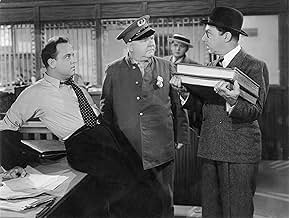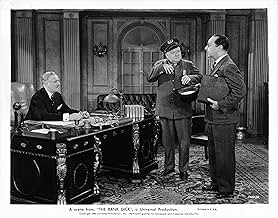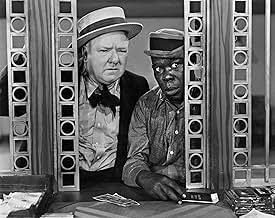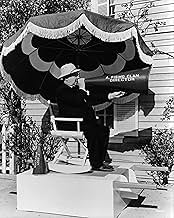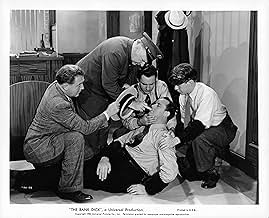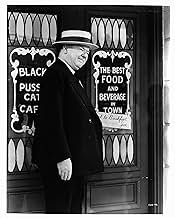PUNTUACIÓN EN IMDb
7,1/10
7,9 mil
TU PUNTUACIÓN
El gallináceo Egbert Sousé vive cómicas aventuras como director de cine suplente e improbable vigilante de un banco.El gallináceo Egbert Sousé vive cómicas aventuras como director de cine suplente e improbable vigilante de un banco.El gallináceo Egbert Sousé vive cómicas aventuras como director de cine suplente e improbable vigilante de un banco.
- Premios
- 1 premio en total
Dick Purcell
- Mackley Q. Greene
- (as Richard Purcell)
Argumento
¿Sabías que...?
- Curiosidades"Mahatma Kane Jeeves" (the pseudonym used by W.C. Fields as screenwriter) is a play on words from stage plays of the era. "My hat, my cane, Jeeves!" And in fact, at the end of the film his butler does hand him his hat and his cane.
- PifiasWhen W.C. Fields enters the hotel room of J. Pinkerton Snoopington, a hand can be seen on the doorknob on the other side pulling the door shut.
- Citas
Egbert Sousé: [at the bar of the Black Pussy Cat cafe] Was I in here last night and did I spend a twenty dollar bill?
Joe Guelpe: Yeah.
Egbert Sousé: Oh boy, what a load that is off my mind! I thought I'd lost it.
- ConexionesFeatured in Frances Farmer Presents: Bank Dick (1958)
- Banda sonoraHome Sweet Home
(1823) (uncredited)
Music by H.R. Bishop
Background music near the beginning of the movie and at the end
Reseña destacada
THE BANK DICK (Universal, 1940), directed by Edward Cline, from an original story and screenplay by Mahatma Kane Jeeves, better known as W.C. Fields, stars none other than W.C. Fields in his third of four comedies for Universal, a classic in the sense of it becoming his most famous and admired works next to IT'S A GIFT (Paramount, 1934). Unlike YOU CAN CHEAT AN HONEST MAN (1939) where Fields loses screen time in favor with a ventriloquist act of Edgar Bergen and Charlie McCarthy; MY LITTLE CHICKADEE (1940) in which he divides his time with Mae West; and NEVER GIVE A SUCKER AN EVEN BREAK (1941) where he steps aside in favor for the singing of the teen-age Gloria Jean, THE BANK DICK is pure Fields from start to finish. As the head of a household of a dysfunctional family, with Fields playing the henpecked husband on screen for the last time, the supporting players consists of a fine assortment of character actors who can be just as funny as Fields himself and not draw attention away from him.
As for the story, set in the town of Lompoc, the focus obviously is on Egbert Souse, accent over the final "E" (W.C. Fields), an unemployed husband who spends much of his leisure time smoking cigarettes and hanging around the local bar, The Black Pussy Cat Cafe, as well as coping with Agatha, his wife, (Cora Witherspoon), Mrs. Hermisillo Brunch, his mother-in-law (Jessie Ralph), Myrtle, his adult daughter, (Una Merkel) and Elsie Mae Adele Brunch, the obnoxious youngster, (Evelyn Del Rio). Of the members in his family, only Myrtle, his eldest, understands him. Aside from being a character herself, she's in love with the hayseed Og Oggilby (Grady Sutton), a bank teller who later encounters a couple of robbers at his window and forced to hand over a large sum of money at a point of a gun. When their getaway car is taken away, the crooks make a run for it. Chased by the police, one gets away while the other is found by Souse seated on a bench nearby, making him a hero for "capturing the crook." In gratitude Souse is awarded a job as a special officer by Mr. Skinner (Pierre Watkin), the bank president. In order for Oggilby to earn enough money to marry Myrtle, Souse arranges for him to invest the bank's money on Beefstake Mines Stock, which finds Souse spending much time preventing the visiting bank examiner (Franklin Pangborn) from looking over the books to find a shortage. More complications occur when the bank gets robbed again with Souse being forced to take the driver's seat in another exciting car chase from the police.
Supporting players enacting under oddball names include Shemp Howard (Joe Guelpe, the bartender whose whistle to "Listen to the Mockingbird" entices Souse to follow him to the bar); Richard Purcell (Mackley Q. Greene); Russell Hicks (J. Frothingham Waterbury); Jack Norton (A. Pismo Clam); Bill Wolfe (Otis), with Jan Duggan, another favorite of the Fields stock players, once again doing a funny bit in a wonderful cameo set in the bank. While Al Hill is credited as Filthy McNasty in the credits, he is called Repulsive Rogan in the final story. As for the support provided by the diversified Una Merkel, her performance is unlike the assortment of starlets, ranging from Mary Brian, Judith Allen or Constance Moore as Fields' daughters playing their roles in a more serious-minded and caring fashion. Merkel provides her role with comic flare and free-spirit. She and and Grady Sutton (in his final Fields comedy) certainly make a perfect odd couple.
THE BANK DICK may have some flaws, such as having the audience accept the middle-aged Fields and Cora Witherspoon as parents to a minor child while physically they pass more as grandparents. However, overlooking such minor details, highlights include Souse filling in for a drunken director (Norton) of Tel-Avis Picture Productions, a movie company filming on location; Sousé getting the bank examiner (Pangborn) ill on a "Michael Finn" drinks in order to keep him from examining the books; the climatic car chase; and bank president Mr. Skinner on two separate occasions giving Sousé the "hearty hand clasp" in which Skinner's fingers barely touches Souse's outstretched palm heightened by going to a split-second freeze-frame. While the attention is focused more on Souses' outside activities than on his domestic affairs, one cannot ignore the underscoring to "There's No Place Like Home" used during each opening scene at the Souse household.
THE BANK DICK, along with MY LITTLE CHICKADEE, became the first of Fields' comedies to be distributed on cassette during the early days of home video in the 1980s. Other than frequent revivals on commercial television prior to 1990, THE BANK DICK assured popularity to a new generation when shifted over to cable stations as American Movie Classics (1995-1999), and later Turner Classic Movies since 2001.
Fields' fourth and final starring role for Universal being NEVER GIVE A SUCKER AN EVEN BREAK (1941) not only reunites him with Franklin Pangborn, but opens and closes with the same underscoring from THE BANK DICK. It even has an in-joke of Fields, playing himself, standing in front of a billboard advertisement which reads "W.C. Fields in THE BANK DICK." Because of these similarities, these both Fields comedies make logical choices as double features whether on television or a DVD package. As THE BANK DICK is a fun movie, it's kind of sad in a way watching W.C. Fields, older and heavier, in what's to become the final phase to his long career. All good things come to an end but the legend of Fields and his movies lives on. (***)
As for the story, set in the town of Lompoc, the focus obviously is on Egbert Souse, accent over the final "E" (W.C. Fields), an unemployed husband who spends much of his leisure time smoking cigarettes and hanging around the local bar, The Black Pussy Cat Cafe, as well as coping with Agatha, his wife, (Cora Witherspoon), Mrs. Hermisillo Brunch, his mother-in-law (Jessie Ralph), Myrtle, his adult daughter, (Una Merkel) and Elsie Mae Adele Brunch, the obnoxious youngster, (Evelyn Del Rio). Of the members in his family, only Myrtle, his eldest, understands him. Aside from being a character herself, she's in love with the hayseed Og Oggilby (Grady Sutton), a bank teller who later encounters a couple of robbers at his window and forced to hand over a large sum of money at a point of a gun. When their getaway car is taken away, the crooks make a run for it. Chased by the police, one gets away while the other is found by Souse seated on a bench nearby, making him a hero for "capturing the crook." In gratitude Souse is awarded a job as a special officer by Mr. Skinner (Pierre Watkin), the bank president. In order for Oggilby to earn enough money to marry Myrtle, Souse arranges for him to invest the bank's money on Beefstake Mines Stock, which finds Souse spending much time preventing the visiting bank examiner (Franklin Pangborn) from looking over the books to find a shortage. More complications occur when the bank gets robbed again with Souse being forced to take the driver's seat in another exciting car chase from the police.
Supporting players enacting under oddball names include Shemp Howard (Joe Guelpe, the bartender whose whistle to "Listen to the Mockingbird" entices Souse to follow him to the bar); Richard Purcell (Mackley Q. Greene); Russell Hicks (J. Frothingham Waterbury); Jack Norton (A. Pismo Clam); Bill Wolfe (Otis), with Jan Duggan, another favorite of the Fields stock players, once again doing a funny bit in a wonderful cameo set in the bank. While Al Hill is credited as Filthy McNasty in the credits, he is called Repulsive Rogan in the final story. As for the support provided by the diversified Una Merkel, her performance is unlike the assortment of starlets, ranging from Mary Brian, Judith Allen or Constance Moore as Fields' daughters playing their roles in a more serious-minded and caring fashion. Merkel provides her role with comic flare and free-spirit. She and and Grady Sutton (in his final Fields comedy) certainly make a perfect odd couple.
THE BANK DICK may have some flaws, such as having the audience accept the middle-aged Fields and Cora Witherspoon as parents to a minor child while physically they pass more as grandparents. However, overlooking such minor details, highlights include Souse filling in for a drunken director (Norton) of Tel-Avis Picture Productions, a movie company filming on location; Sousé getting the bank examiner (Pangborn) ill on a "Michael Finn" drinks in order to keep him from examining the books; the climatic car chase; and bank president Mr. Skinner on two separate occasions giving Sousé the "hearty hand clasp" in which Skinner's fingers barely touches Souse's outstretched palm heightened by going to a split-second freeze-frame. While the attention is focused more on Souses' outside activities than on his domestic affairs, one cannot ignore the underscoring to "There's No Place Like Home" used during each opening scene at the Souse household.
THE BANK DICK, along with MY LITTLE CHICKADEE, became the first of Fields' comedies to be distributed on cassette during the early days of home video in the 1980s. Other than frequent revivals on commercial television prior to 1990, THE BANK DICK assured popularity to a new generation when shifted over to cable stations as American Movie Classics (1995-1999), and later Turner Classic Movies since 2001.
Fields' fourth and final starring role for Universal being NEVER GIVE A SUCKER AN EVEN BREAK (1941) not only reunites him with Franklin Pangborn, but opens and closes with the same underscoring from THE BANK DICK. It even has an in-joke of Fields, playing himself, standing in front of a billboard advertisement which reads "W.C. Fields in THE BANK DICK." Because of these similarities, these both Fields comedies make logical choices as double features whether on television or a DVD package. As THE BANK DICK is a fun movie, it's kind of sad in a way watching W.C. Fields, older and heavier, in what's to become the final phase to his long career. All good things come to an end but the legend of Fields and his movies lives on. (***)
- lugonian
- 28 sept 2005
- Enlace permanente
Selecciones populares
Inicia sesión para calificar y añadir a tu lista para recibir recomendaciones personalizadas
Detalles
- Duración1 hora 12 minutos
- Color
- Relación de aspecto
- 1.37 : 1
Contribuir a esta página
Sugerir un cambio o añadir el contenido que falta

Principal laguna de datos
By what name was Detective a la fuerza (1940) officially released in Canada in English?
Responde
